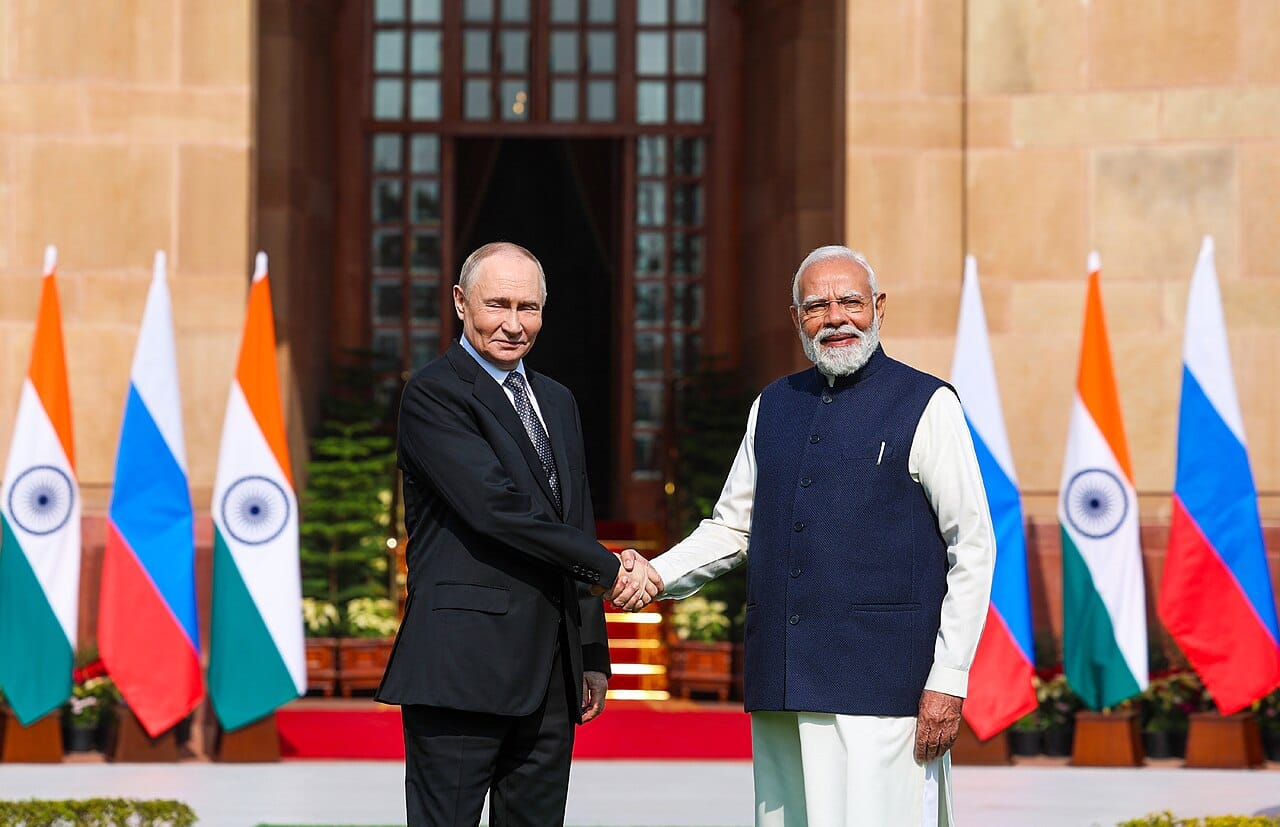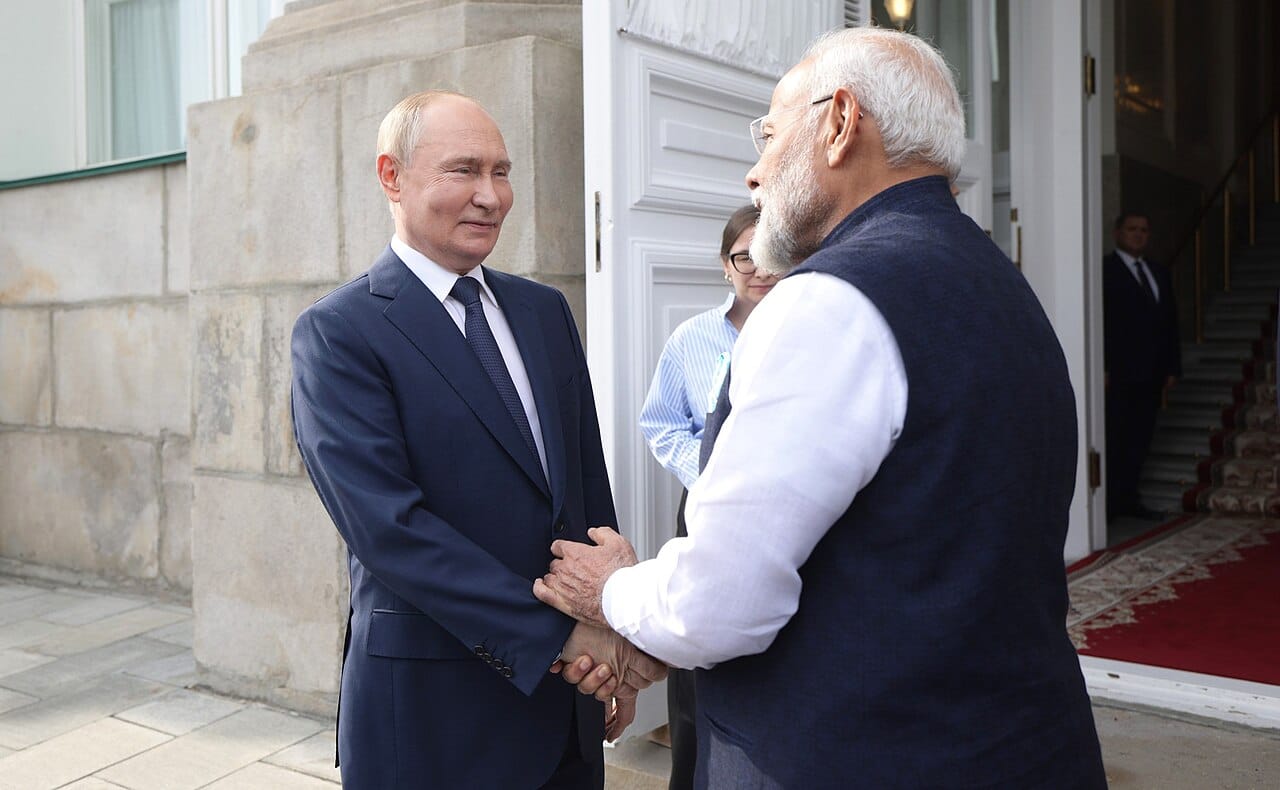The recent two-day visit of Russian President Vladimir Putin to India, culminating in a joint media briefing with Prime Minister Narendra Modi in Delhi, underscored the enduring strength of the India-Russia strategic partnership. This high-profile summit, held against the volatile backdrop of the Ukraine conflict and mounting Western pressure on Delhi, served as a powerful testament to the multifaceted cooperation between the two nations, particularly in energy, trade and defence.
Author: TheViyug
The Evolving Nexus: A Deep Dive into the 23rd India-Russia Annual Summit
The State Visit of Russian President H.E. Mr. Vladimir Putin to New Delhi on December 4-5, 2025, for the 23rd India-Russia Annual Summit, is not merely a routine diplomatic exchange; it represents a pivotal moment in global diplomacy. This summit, occurring against the backdrop of an intensely volatile geopolitical landscape marked by the lingering impacts of the Ukraine conflict, forces a comprehensive reassessment of the ‘Special and Privileged Strategic Partnership.’ The core dynamic now defining this relationship is a sophisticated act of strategic balancing by India, leveraging Russia’s crucial, albeit redefined, military role against a mushrooming, energy-driven economic dependence.
Unhappy Leave: The Radical Idea that could Redefine Work-Life Balance in India
For decades, Indian employees have powered through stress, anxiety, and burnout under the weight of a culture that glorifies overwork. But a quiet revolution may be on the horizon, inspired by a daring experiment in China. Earlier this year, South China Morning Post reported that Pang Dong Lai, a retail company in Henan, introduced “Unhappy Leave”—10 days off per year, no explanations required, simply because employees didn’t feel happy enough to work. The news, also covered by Money control and Business Standard, sparked a global debate about the future of humane work policies.
Not Louder Ads, but Fresher Connections: The Matcha Effect is India’s New Branding Mantra
The production of matcha tea has historically represented a commitment to authenticity and meticulousness in Kyoto. In the crowded digital landscape of India, professionals are keenly searching for that ideal blend of innovation, energy, and trustworthiness. Every company is competing for a limited chance in the smartphone screen market, ranging from beauty brands to food delivery apps. Traditional marketing approaches often struggle to keep pace in this competitive landscape. Introducing the Matcha Effect Model, an innovative framework designed to transform conventional brand development tactics for today’s digital landscape.
Modi vs Indira Gandhi: Leadership Styles That Shaped Two Eras of Indian Politics
On July 25, 2025, Narendra Modi surpassed Indira Gandhi’s tenure as India’s prime minister. He became the second-longest-serving PM after Jawaharlal Nehru. This has opened the debate of Modi vs Indira, who did better leadership within their respective tenures. While Indira Gandhi served 4077 consecutive days from 1966 to 1977, Narendra Modi has surpassed it. Both the leaders have been influential in their own right, impacting the country’s politics, strategy, economy, foreign affairs and nationalism.
Saiyaara: The Bollywood’s Enlightening Star Redefining the Marketing Imagination
Helmed by Mohit Suri and starring fresh faces Ahaan Panday and Aneet Padda, the July 2025 launch of Saiyara defied the conventions of Bollywood. Despite lacking star power, connections to well-known franchises, the film impressively garnered nearly ₹200 crore within just nine days of its release, cultivating a garnered acclaim as one of the year’s best emotionally resonant cinematic experiences. This outcome was not a mere coincidence; it stemmed from astute marketing strategies rooted in behavioural science, emotional branding, and a digital-first approach to communication. The movie’s return on investment transcends mere financial gain; it encapsulates a profound experience.
India is Experiencing a ‘Grief-Tech’ Revolution: AI Bots Mimicking the Dead are Causing a Stir
A new wave of artificial intelligence (AI) products, often called “grief bots” or “ghostbots,” is coming into the memory-driven marketplaces that provide emotional assistance. This […]
Beyond Bans, Teaching Digital Street Smart
With social media bans, censorships, and sweeping online restrictions gaining ground globally — often framed as a cure for the collective anxiety of parents — it’s time to ask the harder questions: Are these bans actually doing any good? Do they address the root cause of the problem, or are they just quick-fix bandages on deeper wounds? We’re well aware of the internet’s pitfalls: doomscrolling, algorithmic echo chambers, and subtle indoctrination.
Trump’s Big Bet: Is the US becoming the Crypto Capital or Risking it All?
In a world already buzzing with geopolitical chaos – be it the Middle East conflict, the ongoing Russia-Ukraine war, the reopened Epstein investigation, or the constant backdoor economic deals – President Donald Trump, now back in the White House in 2025, has dropped another headline-maker. This July, his administration introduced three landmark bills in the House that have already begun stirring debates across party lines and public spheres. As expected, controversy wasn’t far behind.
Creative Economy and Mental Health: The Balance between Passion and Well-Being
The creative economy includes industries like design, media, art, and entertainment, thrives on passion, innovation, and artistic expression. It contributes remarkably to global economies, with UNESCO reporting that the cultural and creative industries generate $2.25 trillion annually and employ 30 million people worldwide. Yet, behind the vibrancy of this sector lies a common issue: the mental health challenges faced by creative professionals.









